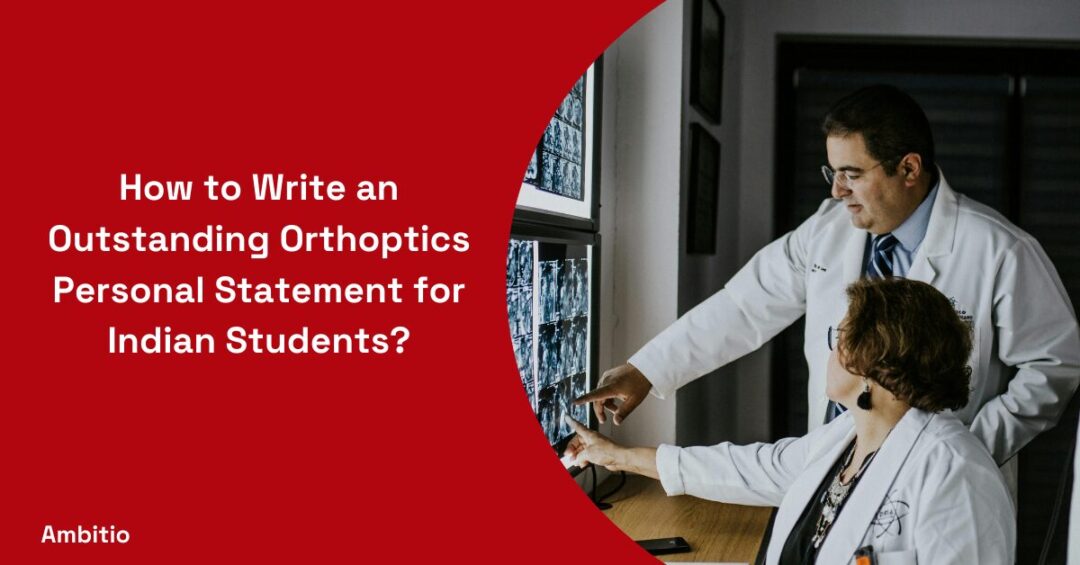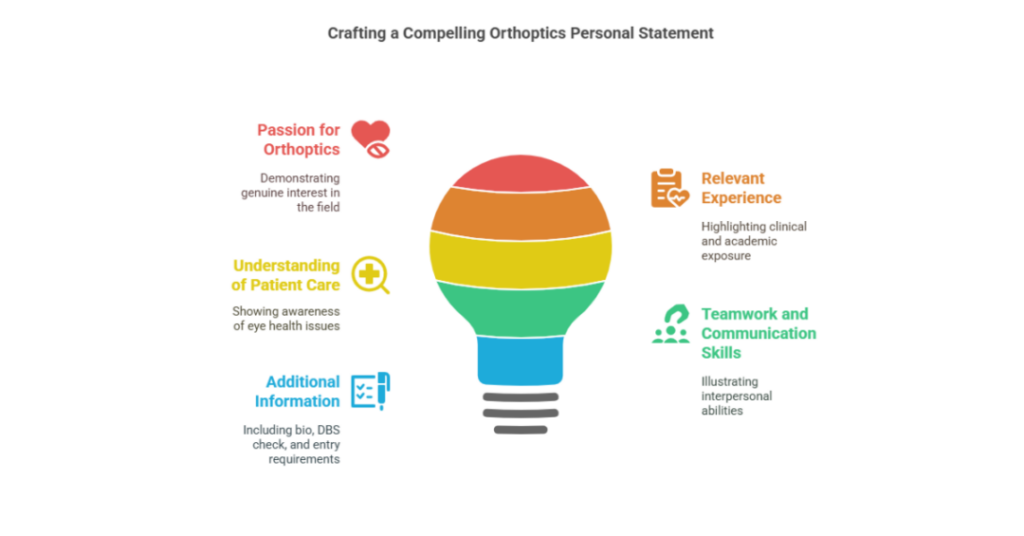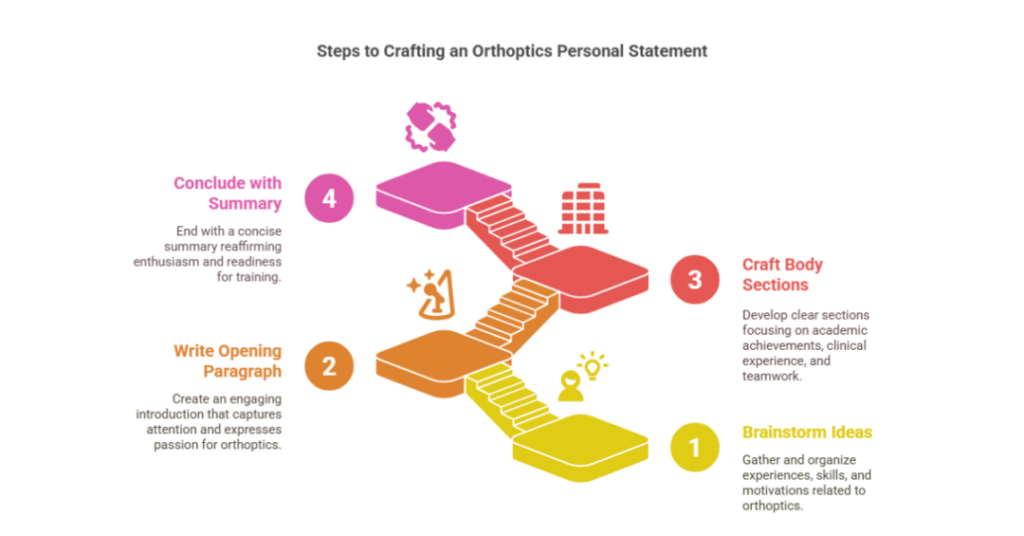14 August 2025
6 minutes read
How to Write an Outstanding Orthoptics Personal Statement for Indian Students?

Key Takeaways
- Orthoptics personal statement is essential for Indian students to highlight passion, skills, and relevant clinical experience.
- Voluntary work and teamwork showcase your readiness for a healthcare career in orthoptics.
- Tailor your statement to programs and emphasize empathy and motivation to stand out.
An effective orthoptics personal statement is essential for Indian students aiming for a career in orthoptics. Highlight your clinical skills, work experience, and passion for helping patients with eye conditions like strabismus and amblyopia.
Whether applying for an undergraduate orthoptics degree or a postgraduate programme via UCAS, show your ability to diagnose, assist hospital staff, and work as part of a team. Voluntary work and placements in local orthoptic departments build essential skills for this allied health profession.
What Is an Orthoptics Personal Statement and Why It Matters?
An orthoptics personal statement for university Application is crucial for Indian students and international applicants applying for a degree in orthoptics or master’s at universities like the University of Sheffield or University of Liverpool. It shows your passion for the orthoptist profession, understanding of ocular and ophthalmic disorders, and readiness to work in NHS or local orthoptic departments.
Highlight your clinical skills, voluntary work, shadowing, and ability to cooperate with hospital staff and healthcare professionals. Mention knowledge of binocular vision, paediatric ophthalmology, and compliance with HCPC requirements. This statement helps tutors assess your potential as a compassionate specialist in eye problems and visual impairments.
Key Elements to Include in Orthoptics Personal Statement for Undergraduate Students
Writing a compelling orthoptics personal statement is essential for Indian students applying for an undergraduate qualification in orthoptics at universities like Glasgow Caledonian University or University College London.

Your statement should clearly demonstrate your passion, relevant work experience, and skills needed to succeed in this full-time healthcare profession approved by the Health and Care Professions Council (HCPC).
Demonstrating Your Passion for Orthoptics
Show your genuine interest by explaining why you are pursuing a career in orthoptics, including any inspiration from working with people with disabilities or special needs in charity or voluntary roles.
Highlighting Relevant Clinical and Academic Experience
Mention any part-time work or volunteer opportunities such as shadowing an optometrist or assisting in local orthoptic departments to gain first-hand clinical skills and experience with patients’ eye conditions and visual impairments.
Showcasing Your Understanding of Patient Care and Eye Health
Demonstrate awareness of ophthalmic, developmental defects, and binocular vision disorders by referencing case studies or knowledge from biological sciences, highlighting how these affect visual abilities.
Emphasizing Teamwork and Communication Skills
Illustrate your interpersonal skills and ability to cooperate as part of a team with hospital staff and other healthcare professionals, supported by examples from preceptorship, extended roles, or charity involvement.
Including your bio, DBS check status, and awareness of entry requirements like IELTS, TOEFL, GRE, or GMAT scores, and scholarships for international students enhances your application. Engaging with resources like Student Room and professional bodies like the British and Irish Orthoptic Society reflects your commitment to the profession.
Step-by-Step Guide to Writing Your Orthoptics Personal Statement
Crafting an effective orthoptics personal statement is crucial for Indian students applying to entry-level programs in orthoptics at top universities in USA and other destinations.

A well-structured statement highlights your ability to work in clinical and team environments, showing your passion for optics, optometry, and patient care.
Brainstorming and Structuring Your Ideas
Start by listing your experiences, skills, and motivation related to orthoptics. Organize these ideas logically to showcase your understanding of eye health, from lens care to diagnosing conditions that may impair vision.
Writing a Strong Opening Paragraph
Create an engaging introduction that grabs attention by sharing why you chose orthoptics and your commitment to the profession. Use a relevant example to help illustrate your passion early on.
Crafting Clear and Impactful Body Sections
Divide the body into sections focusing on academic achievements like your GPA, clinical experience, and teamwork. Explain how your skills match the demands of the profession and highlight any opportunities you had to work with patients or in an organisation.
Concluding with a Convincing Summary
End with a concise summary reaffirming your enthusiasm for the field and readiness for entry-level training. Emphasize your commitment to contributing meaningfully to the orthoptics profession.
Tips to Make Your Orthoptics Personal Statement Stand Out
Writing an impressive orthoptics personal statement is essential for Indian students looking to secure a place in competitive programs.
To rise above others, focus on clear storytelling and showcasing your genuine dedication through real experiences and skills gained during your journey.
Showcase Your Understanding of the Profession
Explain your knowledge of the orthoptics examination process and how you’ve prepared for it, demonstrating familiarity with clinical procedures and patient care.
Highlight Your Practical Experience
Describe any opportunity to work or volunteer in clinical settings, reflecting on what you learned about patient interaction and teamwork, which strengthens your candidacy.
Use Specific Examples
Provide concrete examples to help admissions tutors connect with your story, showing how your experiences shaped your desire to pursue orthoptics.
Be Honest and Reflective
Authenticity in discussing challenges and growth shows maturity and self-awareness, traits valued by admissions committees.
Focus on Skills Beyond Academics
Mention interpersonal and communication skills, as well as your ability to adapt and cooperate in healthcare environments.
Orthoptics Personal Statement Sample and Template
Seeing a well-crafted orthoptics personal statement can inspire Indian students to write their own compelling narratives.
Below is a high-quality personal statement example, followed by a simple template to help you start structuring your personal statement effectively.
Example of a High-Quality Personal Statement
As an aspiring orthoptist, my fascination with eye health began during a voluntary placement at a local hospital’s ophthalmology department. Observing patients with conditions such as strabismus and amblyopia, I was inspired by the specialist orthoptists’ ability to assess and improve patients’ binocular vision. This first-hand experience solidified my passion for pursuing an orthoptics degree, where I can develop the clinical skills and compassionate approach necessary to make a tangible difference in patients’ lives.
My academic background in biological sciences has equipped me with a solid understanding of the anatomical and physiological aspects of the eye. Coupled with this, my part-time work assisting an optometrist has provided me with practical exposure to lens fitting and eye examinations. This opportunity to work closely with patients has enhanced my communication and interpersonal skills, which I believe are vital for an orthoptist working as part of a multidisciplinary healthcare team.
I am particularly drawn to the orthoptics program at the University of Liverpool because of its comprehensive curriculum and clinical placements, which are approved by the Health and Care Professions Council (HCPC). The university’s focus on extended roles and developmental ophthalmic disorders aligns well with my ambition to specialize in paediatric ophthalmology, working with children with special needs and visual impairments.
Additionally, I have taken steps to improve my professional readiness by volunteering with a charity supporting people with disabilities. This experience has taught me the importance of empathy, patience, and adaptability when assisting patients facing complex challenges. I am confident that my commitment, combined with strong academic and practical foundations, will enable me to excel in this demanding yet rewarding profession.
Insights from the Example
- Real Experience: The statement includes specific clinical exposure and voluntary work, showing genuine commitment.
- Relevant Knowledge: It links academic background to practical skills, emphasizing a well-rounded candidate.
- Personal Motivation: Clear explanation of why the applicant is passionate about orthoptics and the chosen specialization.
- Program Fit: Tailored reasons for choosing the university demonstrate research and genuine interest.
- Soft Skills: Emphasizes empathy and teamwork, key for healthcare professions.
Conclusion
In crafting your orthoptics personal statement, remember it’s your chance to showcase passion, skills, and commitment as an Indian student aiming for a rewarding career in orthoptics. A standout statement can open doors to top universities and clinical opportunities worldwide.
Ready to make your application shine? Join Ambitio Elite, the study abroad consultancy that specializes in tailored profile building to highlight your strengths and unique story.
With Ambitio’s expert guidance, you’ll craft a compelling narrative that gets noticed. Don’t just apply, stand out. Take the first step with Ambitio today and unlock your global future!
FAQs
What should I include in my orthoptics personal statement?
Highlight your motivation for orthoptics, relevant experiences, understanding of the profession, and core NHS values.
How can I make my orthoptics personal statement stand out?
Highlight your motivation for orthoptics, relevant experiences, understanding of the profession, and core NHS values.
Should I mention work experience in my orthoptics personal statement?
Yes, discussing shadowing or voluntary work with orthoptists or related healthcare roles strengthens your application.
How important is it to show knowledge of the orthoptist’s role in my personal statement?
Very important; admissions look for applicants who fully understand what an orthoptist does and the demands of the career.
Can I address challenges or weaknesses in my orthoptics personal statement?
Briefly mention challenges only if you focus on what you learned or how you grew from the experience-keep negativity minimal.
How long should my orthoptics personal statement be?
It should be concise, engaging, and within the UCAS limit of 4,000 characters (about 750 words).
What values should I demonstrate in my orthoptics personal statement?
Show commitment to patient care, empathy, professionalism, and alignment with NHS values and standards.

You can study at top universities worldwide!
Get expert tips and tricks to get into top universities with a free expert session.
Book Your Free 30-Minute Session Now! Book a call now




























